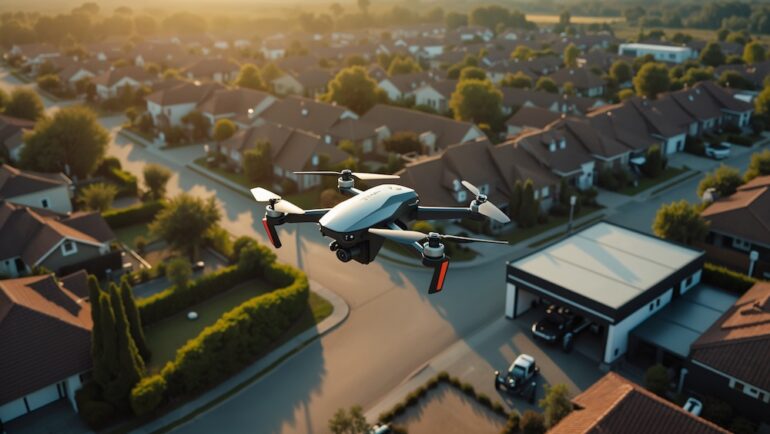News reports of drone swarms flying over the Northeast have raised the question: Can someone fly a drone over your home without your permission? Laws concerning drone use fall under different categories and jurisdictions. Here’s what you need to know.
The qualifiers
The general answer is yes, someone can legally fly a drone over your property. However, drones are regulated by several qualifiers.
First, drones weighing over 55 pounds must be registered with the Federal Aviation Administration (FAA) and be operated within its rules. Pilots of drones under 55 pounds face fewer regulations.
The other major division depends on whether the drone is used for recreational purposes by a hobbyist or for commercial purposes, such as aerial photography.
Recreational users must keep the drone within their line of sight. The drone must be flown under 400 feet in uncontrolled airspace and stay out of airspace over stadiums, public events, public infrastructure, prisons, or the scene of first responders, such as at an accident or fire.
Commercial users have more restrictions. The pilot must be certified, and there are rules regarding maximum altitude, flights over people and vehicles, and night usage. These laws apply even when drone photography is donated to help a nonprofit organization.
Jurisdictional drone rules
The federal regulations cited above are just some of the many. State and local laws also apply, and many cities have rules that duplicate federal law. Misuse may be covered under disorderly conduct, criminal trespass, reckless endangerment, and invasion-of-privacy laws.
Regulations vary by state, but generally, drones can legally fly over your property, with these exceptions:
- When you have notified the operator to stop flying over your property
- When the operator intends to stalk, harass, intimidate, or invade the privacy of the property owner or residents
- If the drone damages property or injures someone
- Suppose the drone uses a camera to photograph someone in a place where he or she should have a reasonable expectation of privacy, such as peeping through a window. In that case, this applies even if the drone is not over the victim’s property at the time, but the camera is pointed in its direction.
What can you do about it?
Call law enforcement and press trespassing charges if a drone operator flies over your property after you have asked them not to. If a drone seems dangerous or appears to be involved in a criminal operation, report it to the police. If a drone is not being operated in accordance with FAA regulations, report it to your local Flight Standards District Office.
Related – Top-Quality Photos and Virtual Tours Are Key in Today’s Market


